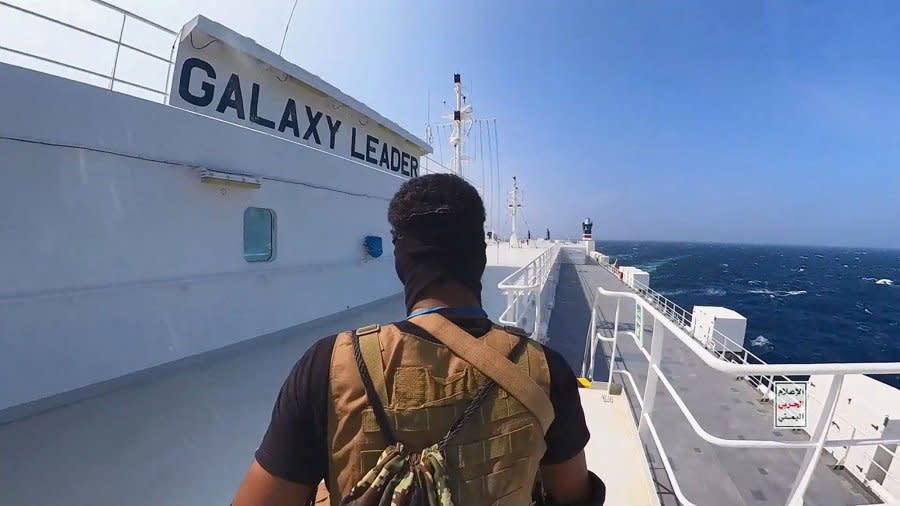U.S. calls on Security Council to act on Houthi attacks in Red Sea

Jan. 4 (UPI) -- The United States is calling on the U.N. Security Council to immediately take action against Houthi rebels who have been attacking vessels traversing the Red Sea trade route amid Israel's war against Hamas in Gaza.
U.S. deputy ambassador to the U.N. Chris Lu told the council Thursday during its first open meeting on the attacks that it is "vital" the 15-member body speak with one voice on the need to uphold international law and navigational rights and freedoms.
He said there have been more than 20 attacks by the rebels in Yemen since Nov. 19, including Wednesday morning.
"In light of both the broad support for council action and continued Houthi attacks, the United States believes that we are at an inflection point," he said.
"These attacks pose grave implications for maritime security, international shipping and commerce. And they undermine the fragile humanitarian situation in Yemen, damaging the ability of the international community to deliver assistance to more than 21 million people in need."
He continued that as they demand for the Houthi rebels to cease their attacks, the council must not overlook their longtime enabler, Iran, which he accused of funding the Houthis, transferring it weapons and being involved in its planning operations in the Red Sea.
"Iran has a choice here: It can continue its current course or it can withhold its support -- without which the Houthis would struggle to effectively track and strike commercial vessels navigating shipping lanes through the Red Sea and Gulf of Aden."
Located in Yemen, the Houthi rebels have been waging a civil war for roughly a decade against the internationally recognized government of Yemen, which is supported by the Saudi-led coalition forces.
Since the war between Hama and Israel began on Oct. 7, the Houthis have attacked civilian infrastructure in Israel and commercial shipping vessels in the important international shipping lane of the Red Sea, which accounts for 15% of global trade.
The Houthis had vowed to target all Israel-bound ships over Israel's war in the Palestinian enclave -- which has resulted in the deaths of more than 22,000 Palestinians, mostly women and children -- but has since expanded its scope seemingly to all vessels.
International Maritime Organization Secretary-General Arsenio Dominguez said that about 18 shipping companies have so far rerouted their vessels around South Africa, which requires an additional 10 days of travel, incurring higher freight rates that are expected to have a negative impact on trade.
Britain's delegation to the Security Council also joined the United States on Wednesday in condemning the attacks while also committing to retaliate.
"If necessary ... we will not hesitate to take action to deter threats to freedom of navigation in the Red Sea," British ambassador to the U.N. James Kariuki told the council.
"Contrary to claims made by the Houthis, these attacks are totally indiscriminate and target shipping that has no connection to Israel."
Members of the council unanimously condemned the attacks, while some, such Russia and Algeria, added that they were happening in reaction to the war in Israel. Some members also called on the Houthis to immediately release the Japanese-operated Galaxy Leader shipping vessel and its 25-person crew, which were seized Nov. 19.
"It is unacceptable that the innocent crew has been detained for more than 40 days," Japanese ambassador to the U.N. Yamazaki Kazuyuki said, while demanding the crew's release and voicing concerns over the deteriorating situation in the Red Sea.
The meeting was held as a coalition of 13 nations, including the United States, Japan, Britain and Australia, separately pledged Wednesday to counter the Houthi attacks.
The seemingly escalating attacks have raised fears that the war in the Middle East may lead to further military escalation.
U.N. Assistant Secretary-General Khaled Khiari called on the Houthi militants to cease all such activity during the council meeting Wednesday, stating it risks to exacerbate regional tensions.
"We reiterate that such incidents originating from Houthi-controlled areas of Yemen must stop. No cause or grievance can justify continuation of these attacks against the freedom of navigation," he said.

